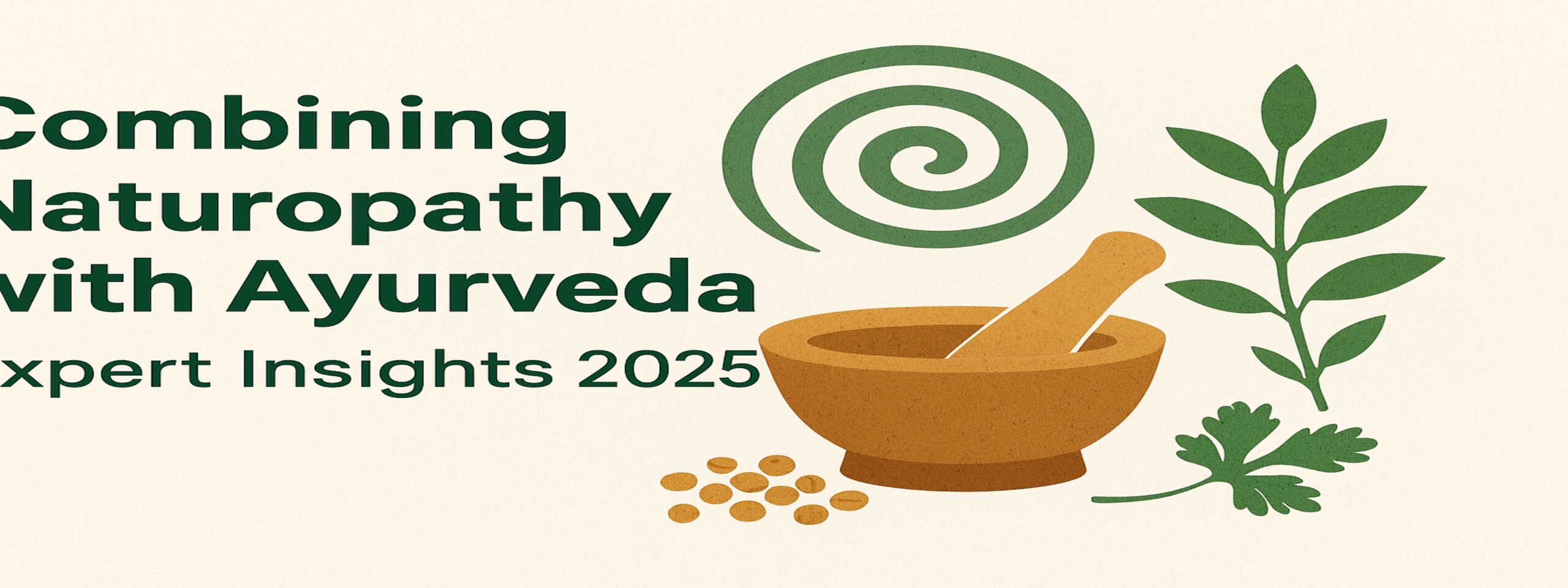Introduction: When Two Healing Traditions Meet
In today’s evolving world of natural wellness, two ancient systems are creating a buzz—Naturopathy and Ayurveda. Both emphasize the body’s innate power to heal itself, yet their combined potential is only beginning to gain recognition. Experts believe that integrating these two approaches—what we call naturopathy ayurveda integration—offers a more complete path to holistic health.
While Ayurveda dates back over 5,000 years, focusing on dosha balance and herbal medicine, Naturopathy, developed in the late 19th century, emphasizes natural therapies like diet, hydrotherapy, and detoxification. When blended, they bridge ancient wisdom and modern science, making holistic wellness more accessible than ever.
Understanding Naturopathy and Ayurveda
What Is Naturopathy?
Naturopathy is a holistic healing system based on the principle that the body has a self-healing mechanism. It uses nature-based treatments—such as hydrotherapy, fasting, nutrition, and exercise—to stimulate the body’s natural defenses. The goal is prevention and long-term vitality rather than symptom management.
What Is Ayurveda?
Ayurveda, India’s traditional system of medicine, focuses on the balance of three doshas—Vata, Pitta, and Kapha. Through herbal remedies, dietary guidelines, yoga, and panchakarma detox, Ayurveda seeks to harmonize the body, mind, and spirit. Unlike many modern medical systems, it treats the root cause, not just the symptoms.
Expert Insights: The Synergy Between Naturopathy and Ayurveda
When combined thoughtfully, these two disciplines complement each other beautifully. According to Dr. Meera Joshi, a leading Ayurvedic physician and naturopathy researcher, “Naturopathy focuses on restoring physical balance through nature-based therapies, while Ayurveda goes deeper—aligning energy and consciousness. Together, they create a complete ecosystem for healing.”
How Integration Works
- Diet and Nutrition: Ayurveda prescribes foods according to your dosha, while Naturopathy supports detox and proper nutrient absorption.
- Detoxification: Panchakarma (Ayurveda) and fasting or hydrotherapy (Naturopathy) together create a powerful cleansing regime.
- Mind-Body Balance: Yoga and meditation, common to both, amplify self-awareness and stress relief.
- Preventive Care: Naturopathy’s focus on hygiene and immunity strengthens the Ayurvedic principle of Swasthasya Swasthya Rakshanam—preserving the health of the healthy.
According to a 2025 review in the Journal of Integrative Health, patients who followed combined Ayurvedic and naturopathic protocols showed 35% faster recovery in chronic conditions like arthritis, hypertension, and digestive issues.
Benefits of Combining Naturopathy with Ayurveda
1. Holistic Healing
Together, they treat not just the physical but also the emotional and spiritual layers of health, promoting overall harmony.
2. Enhanced Detoxification
Naturopathic fasting and Ayurvedic cleansing therapies complement each other, helping eliminate toxins more efficiently.
3. Personalized Wellness
While Ayurveda customizes care based on dosha types, Naturopathy tailors it based on body constitution and environment—creating an adaptive, individualized plan.
4. Sustainable Lifestyle Changes
This combination emphasizes daily discipline (Dinacharya) and mindful living—offering long-term well-being rather than temporary relief.
Practical Ways to Integrate Both Systems
Step 1: Start with Ayurvedic Assessment
Identify your dosha (Vata, Pitta, or Kapha) through a consultation or quiz. This helps determine your ideal diet and lifestyle plan.
Step 2: Add Naturopathic Practices
Incorporate simple habits like morning sun exposure, cold water therapy, and clean eating. These align with Ayurvedic principles of purity and balance.
Step 3: Use Herbal and Natural Support
Combine Ayurvedic herbs like ashwagandha, triphala, or tulsi with naturopathic supplements like probiotics or herbal teas—under expert guidance.
Step 4: Maintain Mindfulness
Both systems emphasize meditation, pranayama, and grounding exercises to strengthen emotional resilience and reduce stress.
Potential Challenges and Expert Advice
While integration sounds ideal, experts warn against self-prescribing. Dr. Rajeev Sharma, a naturopathy and Ayurveda consultant, notes:
“Patients often mix remedies without understanding their doshic effect or contraindications. Professional guidance ensures safety and efficacy.”
Common Mistakes to Avoid
- Overlapping detox methods (like fasting and panchakarma simultaneously)
- Ignoring body constitution while following generic diets
- Using herbs without medical supervision
Always consult certified practitioners from both systems before combining treatments.
Real-Life Case Study: A Healing Story
Anita Rao, a 42-year-old professional from Delhi, suffered from chronic fatigue and hormonal imbalance. After combining Ayurvedic panchakarma with naturopathic diet therapy, her energy improved dramatically within three months. “It wasn’t just my body that healed,” she says. “My mental clarity and mood also balanced.”
Her story reflects a growing trend—patients seeking multi-disciplinary wellness guided by ancient science and modern understanding.
Conclusion: The Future of Holistic Healing
The future of wellness lies in integration. Naturopathy and Ayurveda, when used together, form a symphony of natural healing that modern medicine is beginning to acknowledge. By addressing the root cause, balancing body energies, and supporting natural detoxification, this union can redefine preventive healthcare.
If you’re exploring holistic living, consult an expert in both systems and experience the synergy yourself.
True healing begins when nature’s wisdom meets mindful practice.
FAQs Section
1. What is the main difference between Naturopathy and Ayurveda?
Naturopathy emphasizes nature-based therapies and self-healing, while Ayurveda focuses on balancing doshas using herbs, diet, and lifestyle.
2. Can Naturopathy and Ayurveda be used together?
Yes. When integrated under expert supervision, they complement each other—enhancing detox, immunity, and emotional balance.
3. What conditions benefit most from combining these systems?
Chronic fatigue, stress, hormonal imbalance, arthritis, and digestive issues respond well to combined naturopathy and Ayurvedic care.
4. Are there risks in mixing Naturopathy and Ayurveda?
Only if done without guidance. Consult trained practitioners to avoid overlaps in detox or herbal treatments.
5. Is this approach scientifically supported?
Yes. Recent integrative health studies show faster recovery and improved quality of life when both methods are combined.

